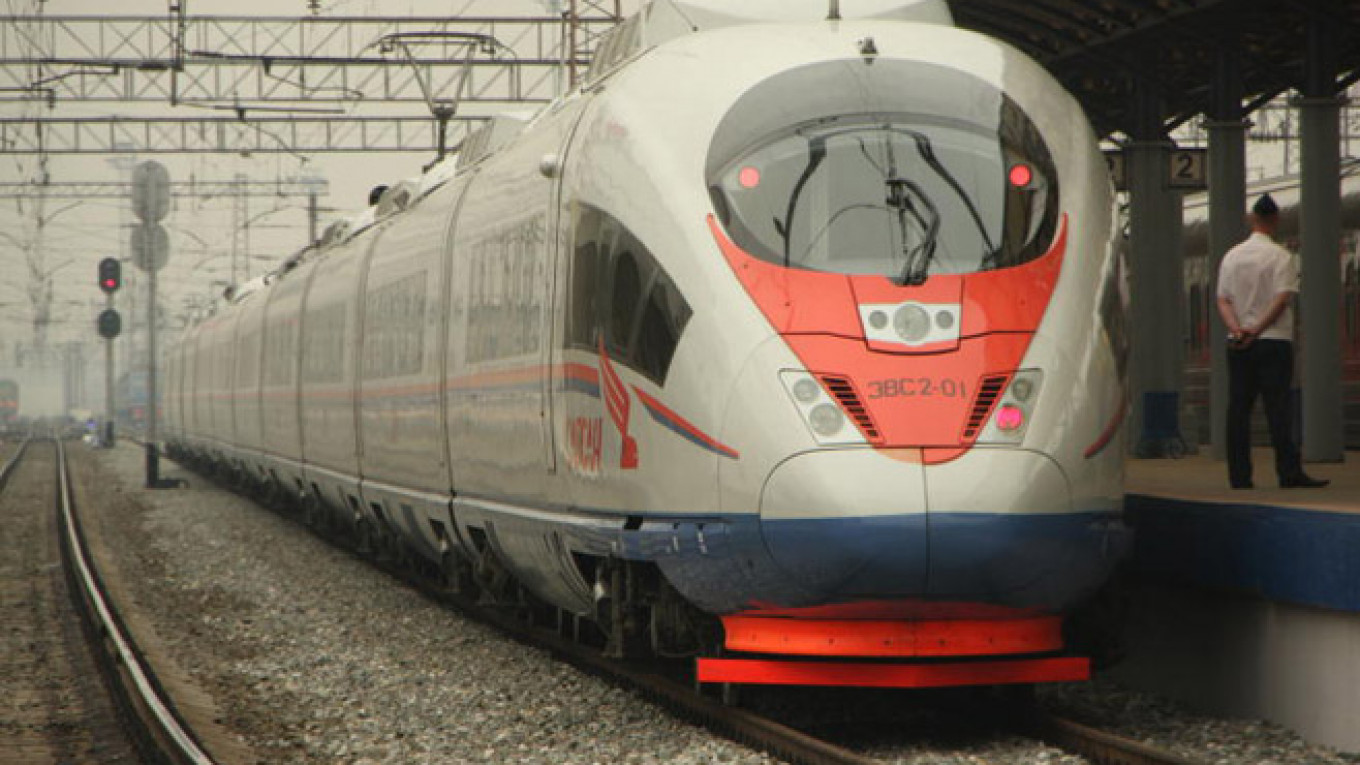The government is likely to support a multibillion dollar high-speed rail line between Moscow and Kazan, even though financing will be delayed, the deputy transportation minister said Thursday at the Ninth International Strategic Partnership 1520 business forum in Sochi.
"In the federal budget for 2015 to 2017, the Transportation Ministry has reserved all of the funds required to build the line," Deputy Minister Alexei Tsydenov said, adding that the project has total government support.
The overall cost of the project to build an almost 800-kilometer-long line from Moscow southeast to Kazan, including the purchase of high-speed trains and the modernization of railway stations, has been set at 1 trillion rubles ($29 billion).
The financial structure is subject to change but an updated version of the project presented in February said that only 386 billion rubles ($10.7 billion) of the sum will come directly from the state budget, while the rest will be covered by loans and private investment.
The rail line was slated to be designed in 2014 and built by the end of 2018, but the tender to design and construct the railroad, and provide trains for it — the results of which were to be announced last December — has not been put out yet.
More doubts were cast on the likelihood of Moscow-Kazan rail line being built at all when the government started redirecting large sums of money from major infrastructure projects to support the Crimea region, which became part of Russia in March.
But even though uncertainty about the project's terms and dates lingers on, engineering firms, suppliers and producers of bullet trains are prepared to get involved.
Germany's Siemens and France's Alstom confirmed their interest in participating in the project at the forum on Thursday.
"For the Moscow to Kazan rail line we are offering our latest-generation train. It will have a new level of comfort and safety, will be a big step forward in terms of energy efficiency," Dietrich Möller, Siemens' president for Russia and Central Asia, told The Moscow Times.
Besides the rolling stock Siemens is ready to provide engineering solutions and project management.
Furthermore, Russia-based steel and mining conglomerate Evraz has recently developed technology to produce 100-meter-long rails, used in high-speed rail construction, and is prepared to supply them for construction of the Moscow-Kazan rail line, Ilya Shirokobrod, EvrazHolding's vice president told journalists Thursday.
Until recently, only the U.S. and Japan had the technology to make such rails. Japanese-made rails were used to modernize the high-speed rail line between Moscow and St. Petersburg.
See also:
Russian Railways Won't Publish Yakunin's Pay Packet
Contact the author at a.panin@imedia.ru
A Message from The Moscow Times:
Dear readers,
We are facing unprecedented challenges. Russia's Prosecutor General's Office has designated The Moscow Times as an "undesirable" organization, criminalizing our work and putting our staff at risk of prosecution. This follows our earlier unjust labeling as a "foreign agent."
These actions are direct attempts to silence independent journalism in Russia. The authorities claim our work "discredits the decisions of the Russian leadership." We see things differently: we strive to provide accurate, unbiased reporting on Russia.
We, the journalists of The Moscow Times, refuse to be silenced. But to continue our work, we need your help.
Your support, no matter how small, makes a world of difference. If you can, please support us monthly starting from just $2. It's quick to set up, and every contribution makes a significant impact.
By supporting The Moscow Times, you're defending open, independent journalism in the face of repression. Thank you for standing with us.
Remind me later.






